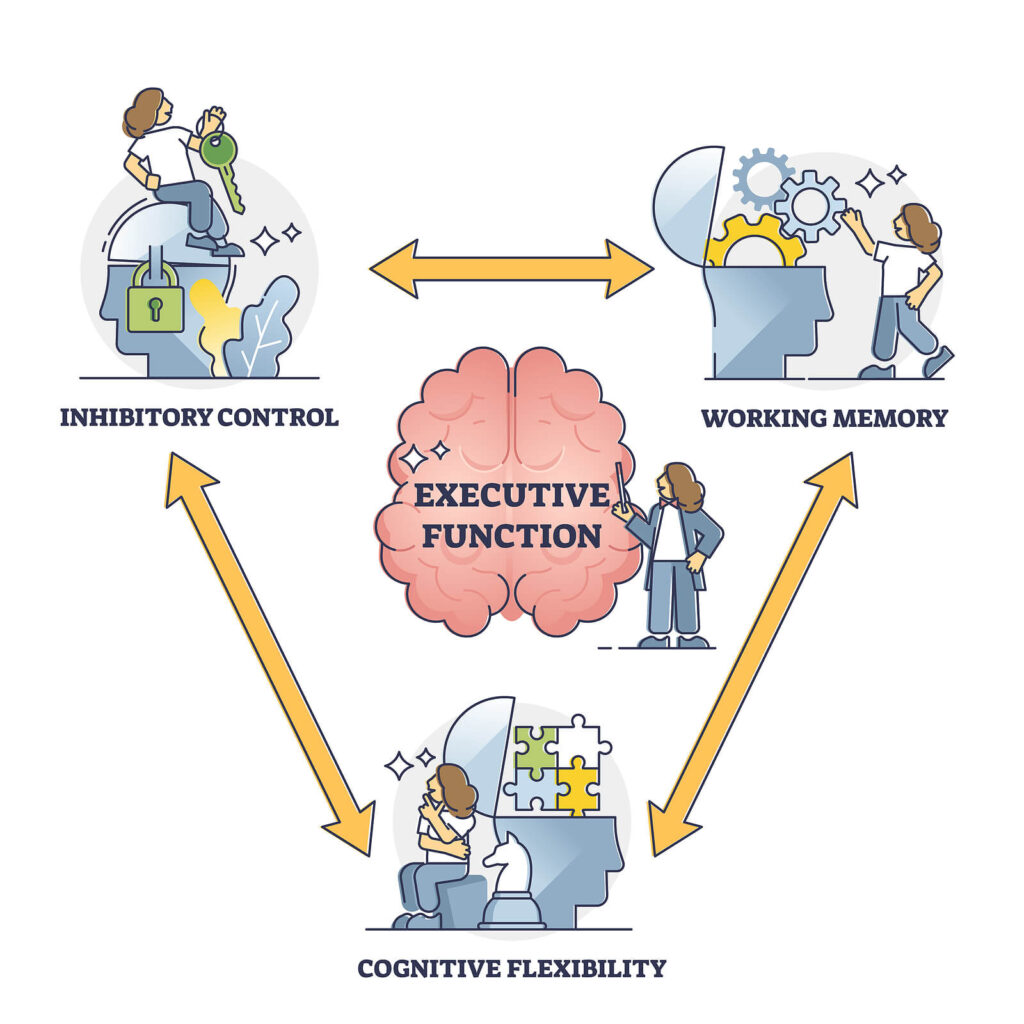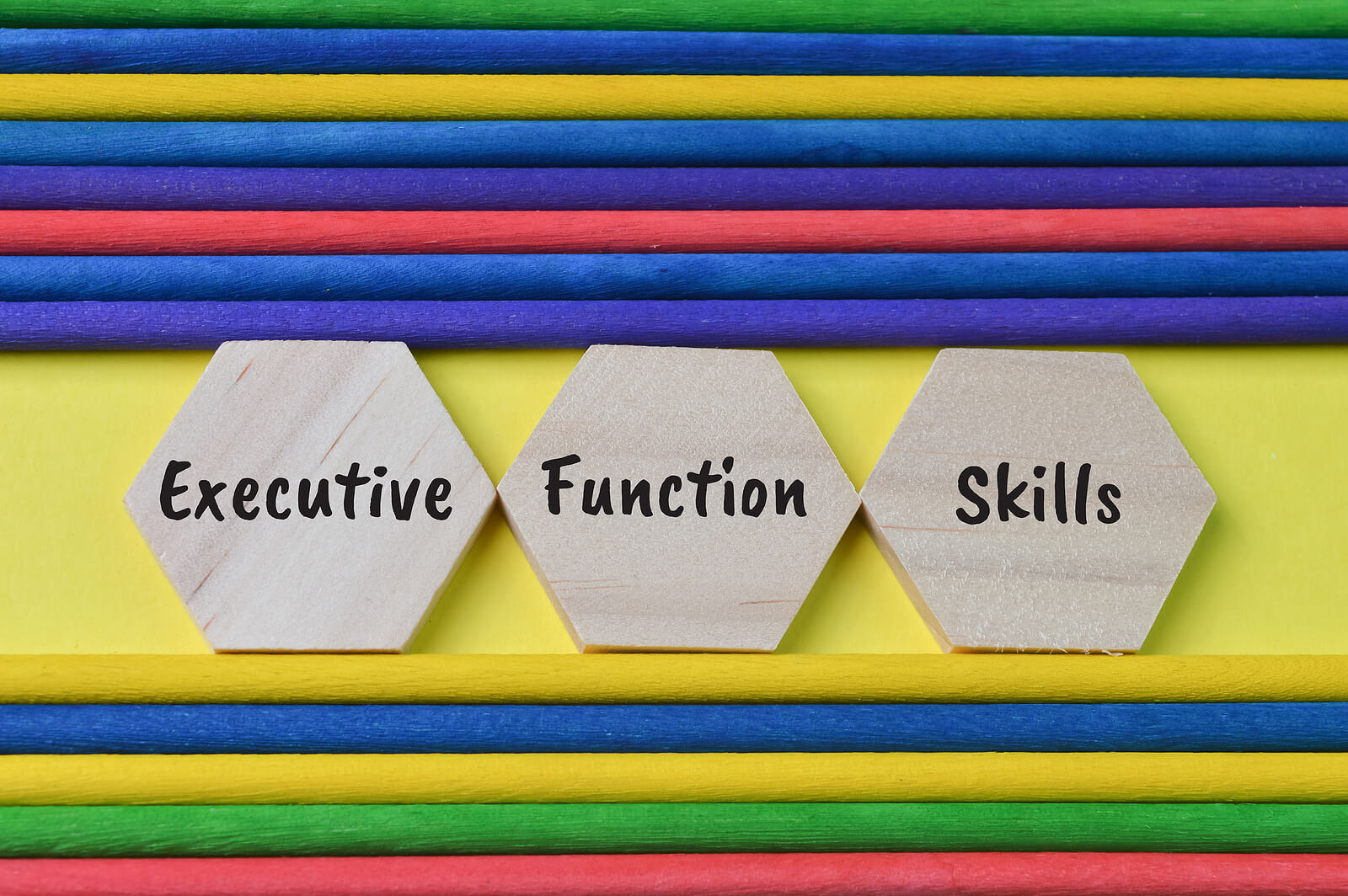Attention deficit hyperactivity disorder, or ADHD, an already common childhood disorder, has seen a rise in online popularity as more and more people are taking to social media to increase awareness of the disorder. Hashtags like #ADHD and #ADHDinwomen – with billions of views – serve as a community for people diagnosed with ADHD and professionals in the field to share experiences and information about the disorder. If you’ve found yourself down an #ADHDTikTok rabbit hole, you’ve probably also stumbled across #executivefunction; but what is executive functioning and what does it have to do with ADHD?

Executive Functions
Executive function, sometimes referred to as the brain’s CEO, is a set of cognitive and mental processes that enables individuals to set and achieve goals through self-regulation and sustained self-directed behavior. These functions help us plan, focus our attention, evaluate our actions, prioritize steps, and control our impulses to successfully execute goal-directed actions. People with poor executive function, or executive dysfunction, may struggle with keeping organized, completing tasks, analyzing information, following multiple-step instructions, and balancing various demands. ADHD symptoms suggest a deficit in executive functioning skills, hence why the two are often talked about together. It is important to note that the terms are similar, not interchangeable. Besides, individuals with autism, learning disabilities, obsessive-compulsive disorder, anxiety, and depression may also present with poor executive function.
So what are the executive functioning skills?
Executive function skills play a key part in managing daily responsibilities, demonstrating a good work ethic, and achieving long-term goals. They can be broken down into several categories: inhibition, planning, shifting, working memory, emotion regulation, organizing, self-monitoring, and task initiation.
Organizing
Organizing is the ability to create systems, impose order, and arrange both mental and physical things in a way that makes sense. Having a systematic arrangement for things means everything has a home and it is easy to manage or access when needed.
Working memory
Working memory is the capacity to store information in memory for the purpose of completing a task. It can also be thought of as brain juggling. Think about how you can listen and take notes during a meeting or remember the requirements for a letter you need to write.
Time management

Maximizing productivity and efficiency in the time spent completing a task. Using time wisely involves accurately estimating how long a task will take, prioritizing the steps, and meeting deadlines. Examples of poor time management related to ADHD are time blindness, not knowing how much time has passed, chronic lateness, and spending more time on a task than necessary.
Self-monitoring
This refers to reflecting on and analyzing your performance when completing a task. That means considering the effectiveness of your strategy and recognizing if it needs adjusting. An example of self-monitoring would be undergoing training for a promotion at work and acknowledging that you’re learning and implementing new skills too.
Planning
The process of thinking about what is needed to accomplish a goal and establishing a list of relevant steps.
Initiation
The ability to start a task on one’s own will. Difficulty with task initiation is a symptom of ADHD specifically when the task is undesirable or requires mental labor. Additionally, an individual with ADHD may have trouble sustaining attention for an extended period. This often leads to procrastination unless there is a significant negative consequence in place or time pressure nearing.
Shifting
An ability to move easily from one task to another and adapt to new situations that arise. This flexibility allows individuals to respond appropriately to changes by thinking of new plans or ideas when the original does not go as planned.
Inhibition
Inhibition, or impulse control is the ability to stop ourselves from behaving in an undesirable way. Resisting the urge to act without thinking allows us to make choices based on logic and rational, in the present and for the future.

Examples of inhibition are taking a break during an emotionally intense discussion or keeping your phone on silent during work hours.
Emotional regulation
is the ability to identify and manage your emotions in a healthy way -understanding your feelings in an intense situation and controlling extreme reactions by incorporating rational thinking.
An example would be using coping skills during an anxiety spiral to engage in problem-solving or proceed with a task.
How Executive Functioning Impacts Daily Life
To say our realities have changed in the last few years would be an understatement. As a society we are constantly preparing and planning, making decisions, balancing multiple responsibilities, thinking about the future, trying to stay up-to-date, and the list goes on. The overwhelming number of demands placed on us takes a toll on our overall health and you may start to notice a decline in executive function. If this is a concern for you or you would just like to enhance your skills, consider seeking a professional who offers executive functioning, ADHD coaching, or ADHD therapy. Our ADHD therapists at Kind Mind Psychology offer a safe and supportive space to explore these feelings.
Get Support for Executive Functioning and ADHD at Kind Mind Psychology
Struggling with executive function challenges can feel overwhelming, but you don’t have to navigate it alone. At Kind Mind Psychology, we offer ADHD therapy in Charlotte, NC, to help you build skills, improve organization, and manage daily responsibilities with confidence. Our therapists provide a supportive space to explore strategies that work for you, whether it’s time management, emotional regulation, or task initiation. Ready to take the next step?
- Contact us today to get started.
- Read more about ADHD by exploring our blogs.
- Learn how ADHD therapy can help you regain control and thrive!
Other Services We Offer in New York and North Carolina
Beyond ADHD therapy, we offer a variety of supportive options to meet your needs. For those in the LGBTQIA+ community, we offer affirming and compassionate LGBTQ+ therapy, where you can explore and embrace your identity. We also provide couples therapy to help partners build stronger, more meaningful relationships. For individuals healing from trauma, our specialized EMDR and Internal Family Systems (IFS) therapies offer pathways to deep emotional healing and resilience. No matter what you’re facing, we’re here to support your growth and well-being.

